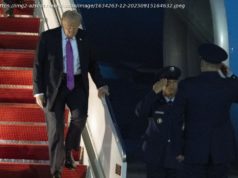The country is struggling with a financial crisis prompted by concerns over economic policies and a diplomatic dispute with the U. S.
ANKARA, Turkey — Turkey’s central bank took action Monday to free up cash for banks as the country grapples with a currency crisis sparked by concerns over President Recep Tayyip Erdogan’s economic policies and a trade and diplomatic dispute with the United States.
The Turkish lira has nosedived over the past week, accelerating a months-long decline, and tumbled another 7 percent Monday as the central bank’s measures failed to restore market confidence.
Investors are worried about a confluence of factors: the country’s reliance on foreign loans that may stop flowing in as interest rates rise in other economies, like the U. S.; Erdogan’s insistence that the central bank not raise interest rates, as most independent analysts say it should; and a spat with the U. S. that has led to sanctions and the fear of greater isolation from longtime allies in the West.
The uncertainty pushed down world stock markets and briefly caused a sharp drop in the currencies of other emerging countries, such as South Africa and India, amid concerns that investors might see similar problems in their economies.
The lira hit a record low of 7.23 per dollar late Sunday after Erdogan remained defiant in his economic policies and the standoff against the United States, a NATO ally.
“Turkey is faced with an economic siege,” Erdogan said Monday, in the latest of a series of speeches. “We are taking the necessary steps against these attacks and will continue to do so.”
He has threatened to seek new alliances – a veiled hint at closer ties with Russia – and warned of drastic measures if businesses withdraw foreign currency from banks.
Erdogan also ruled out the possibility of higher interest rates, as they can slow economic growth. But independent analysts say higher rates are needed urgently to stabilize the currency and Erdogan’s hard line is one of the reasons investors are worrying.
Erdogan won a second term in office in June under a new system of government that gives him sweeping powers. He has used his new power to pressure the central bank to not raise rates.
On Monday, the central bank announced a series of measures to “provide all the liquidity the banks need” – but offered no hint of a rate increase.
The moves are meant to grease the financial system, ease worries about trouble at banks and keep them providing loans to people and businesses.
In times of high uncertainty, banks tend to shy away from lending to each other. A so-called credit crunch, a lack of daily liquidity, can cause a bank to collapse.
Simon Derrick, chief currency strategist at BNY Mellon, said the central bank’s measures are unlikely to be enough. The lira has now dropped some 45 percent this year.
Part of the concerns about Turkey are the same as other emerging markets. As interest rates rise in the U. S., investors pull their money out of countries that had enjoyed strong economic growth but are perceived as somewhat riskier.
Turkey’s situation is among the most precarious among emerging markets because so much of its growth was fueled with debt in foreign currencies. That makes the currency drop so much more painful as it will increase the cost of servicing debt for Turkish companies and banks and could lead to bankruptcies.
So far, the impact on developed economies has been relatively contained. Stocks have fallen modestly in the U. S. and Europe since last week, but analysts do not see a big risk of financial turmoil. A few European banks have businesses there that could lead to losses, but that is not expected to pose a systemic danger to the region.
Among the most important things investors are watching out for is whether Turkey, in an effort to stymie the outflow of capital from the country, puts limits on money flows.
Berat Albayrak, Turkey’s finance chief – and Erdogan’s son-in-law – said Sunday that the government had no plans to seize foreign currency deposits or convert deposits to the Turkish lira. He said it had readied an “action plan,” without elaborating.
The country’s economic trouble has been heightened by a dispute with the U. S. that has centered on the continued detention of an American pastor who is on trial for espionage and terror-related charges. The U. S. has responded by slapping financial sanctions on two ministers and later doubled steel and aluminum tariffs on Turkey.
Foreign Minister Mevlut Cavusoglu said Monday that the United States would not achieve aims by exerting pressure and imposing sanctions on Turkey.
Send questions/comments to the editors.






